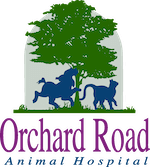
Have the holidays happy and joyful for your furry family members. Keep them safe from Holiday Hazards!
Table Scraps: Table scraps may seem like a fun way to include a pet in the holiday, but many foods are poisonous to pets including onions, garlic, raisins and grapes. In addition, they may cause intestinal upset and can also be very fattening. As an alternative, offer a new treat or a toy designed specifically for pets.
Sweets: Too much candy is as bad for your pet as it is for owners. Stomach aches and cavities are the minor side effects. Over-indulgence in chocolate can prove fatal. Chocolate poisoning is caused by theobromine, a caffeine chemical substance found naturally in chocolate.
Antifreeze: Antifreeze can be lethal. It contains ethylene glycol, which is sweet and tempting to your pet. Always clean up spills in the garage or driveway. If you pet has ingested some, or you think he has, contact the clinic immediately.
Aspirin, Tylenol & Ibuprofen: In both dogs and cats, these drugs can be harmful or even fatal if given incorrectly. Pain relievers, anti-diarrheal medication and other over the counter medications should never be given without consulting your veterinarian.
Car Engines: As the weather turns colder, cats like to sleep near a warm car engine. They may curl up on or under the hood. Make sure you always know the location of your pet and honk your horn or bang the hood before starting the car.
String: Caution should be used when string toys, ribbons or tinsel are present. Dogs & cats are very tempted to chew on these objects, which can easily be ingested. The ingestion of string-like objects can cause severe intestinal damage, which often requires surgery to repair.
Holiday Plants: Holly, mistletoe and poinsettias are extremely poisonous when eaten. You can enjoy their beauty by placing them well out of reach of curious pets.
Christmas Trees and Tree Water Additives: Make sure your tree is well secured. If you have a tree climbing cat or a large dog, anchor the top of the tree to the wall. Also prevent your pet from ingesting the pine needles; they can cause oral ulcerations or puncture intestines. Tree life extenders can be very harmful to your pet. Cover tree stands to prevent your pet from drinking them.
Ornaments: Sharp or breakable tree ornaments, yarns, ribbons, angel hair and icicles should be kept out of your pet’s reach. Hang them high on the tree and make sure your packages are securely wrapped.
Electric Cords: Dogs and cats like to chew on everything! Keep cords out of reach!
Rodent Poisons: Rat and mouse poisons (e.g. D-Con) may contain warfarin, which can be fatal even in small doses. Seek veterinary care immediately if you suspect your pet has ingested any poisonous material.
Cigarettes and Nicotine: Cigarette and nicotine ingestion can lead to nicotine intoxication, which can cause hyperactivity or paralysis. If your pet eats a product containing nicotine, contact your veterinarian immediately.
Rock Salt: Rock salt used to melt snow and ice can cause irritation to paw pads. Rubbing a small amount of baby oil and baby powder on the pads before going outside may help prevent this. Wipe the pads off before coming inside.
Doors: Keep an eye on pets when visitors are present. Your pet may unknowingly escape when someone comes in or goes out. Having a microchip implanted in your pet will help your pet be returned to you should they escape.
Frostbite: Frostbite is the number one winter pet hazard. Cats should stay indoors and owners should shorten dog exercise walks when the temperature falls.
Adequate shelter: If your pet must be outside at all, make sure you provide adequate shelter from the wind. A doghouse should be no more than three times the size of the dog. A blanket inside makes a nice, warm addition.
Dehydration: Make sure your pet’s water stay unfrozen. It’s better to use a porcelain pottery bowl rather than metal to prevent tongues from sticking to the bowl during low temperatures.


